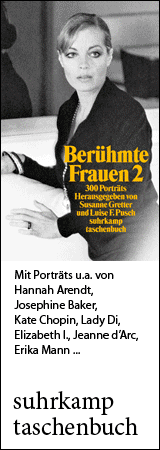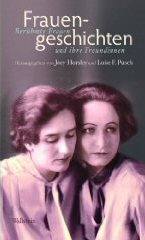
(Heide Simonis, née Steinhardt)
born on July 4, 1943 in Bonn/Germany
German politician (SPD) and economist; Minister-President of Schleswig-Holstein, 1993-2005
80th birthday on July 4, 2023
Biography
A woman is elected and an older man exclaims in the Low German still spoken by some in northern Germany:“Eene eenzige Frau regeert dat wunnerschöne Land ganz alleen.” He shakes his head and says: “Oh no! That cannot be!” to Heide Simonis at a farmers' association event after she unexpectedly becomes minister-president of Schleswig-Holstein on May 19, 1993.
Heide Simonis is the only one of the talented SPD women of the first post-war generation to make it this far up the ladder: youngest member of parliament in the Bundestag; the only female member of the federal Budget Committee; the first woman to serve as head of a state government in German history.
In her book Unter Männern (Among Men, 2003), she formulates policy positions in an engaging and entertaining way, but also reports on comrades undermining her: “And the vultures start circling overhead just as you take your seat.”
Heide Simonis née Steinhardt is the oldest of three sisters. She reacted to the hardships of the post-war period (uprooting, constrictions, frequent quarrels with her unhappy mother) with severe asthma that necessitated spending many months in children's homes starting at the age of three.
“I was quite happy in most homes and quickly adapted to the new environment.”
In 1962, she graduated from a girls' high school and studied economics and sociology in Erlangen, Nuremberg and Kiel. In 1967, she received her degree in economics. She married Dr. Udo E. Simonis, a professor of ecology, in the same year and followed him to Africa (1967/68, Zambia) as well as to Japan (1970-1972, Tokyo).
“It was I who proposed to Udo - someone had to take the lead ... He swallowed dryly for a moment and then said yes ... That wedding day! He sits there, pale, small, in a dark suit and me next to him with a pillbox hat like Jackie Kennedy and in some sort of pink-purplish dress.”
The asthma attacks soon stopped altogether. Her husband was one of “those few sweethearts among men” who encouraged his wife and supported her career. Her father and two sisters were also confidants in difficult situations.
Heide Simonis joined the SPD in 1969 and began her arduous trek to the top. Soon realizing that the real decisions are made in the back room of a pub after the official end of a meeting, she always held out until the bitter end, i.e. until two or half past three in the morning.
The desire to have a child was never a high priority for her: “I guess I was afraid that the difficult relationship with my mother might repeat itself.”
Heide Simonis likes to be around people and loves to make a difference.
Some of her political stations: executive member of the municipal council in Kiel, member of the Kiel city council, elected to the Bundestag, parliamentary group spokeswoman of the budget committee, member of the state legislature of Schleswig-Holstein… From 1988-1991 she was a member of the federal executive body of the SPD, and from 1993-2005 she was Minister-President of Schleswig-Holstein.
Despite financial difficulties this ‘sleepy’ state (‘Schläfrig-Holstein’) became more modern during her time in office with cutting-edge industries such as biotechnology and medical technology. She drove the restructuring of public administration forward and did not hesitate to implement unpopular measures.
In 2000, for the first time in Germany, there were more women than men in her government in Kiel.
Despite her great popularity, it was her own comrades who denied her a majority in four rounds of voting in the 2005 state elections.
“Fighting against open knives is not easy, but sometimes necessary in politics. However, there are no defenses against an insidious stab in the back.”
Embittered, Heide Simonis resigned from all political offices and initially also considered leaving the SPD.
Building on her experiences in Zambia in 1967/68 where she was a lecturer in German at the University of Lusaka, she chose to become involved in development aid. In 2006 she was unanimously elected honorary federal chairwoman of UNICEF Germany.
Germany has lost a thoroughbred politician.
(Text from 2007, translated with DeepL.com; edited by Ramona Fararo, 2023).QUOTES
For additional information (pictures, bibliography) please consult the German version.
Author: Birgit-Elisabeth Rühe-Freist
Quotes
The women's movement undoubtedly deserves great credit. Feminism awakened the public, and self-awareness groups also played an important role in the general change of consciousness. The growing sensitivity later benefited women working in political parties and institutions. Without the women's movement, for example, quotas wouldn’t have existed - a political demand that I initially considered superfluous, but whose necessity became more and more apparent to me as I gained experience. However, I never wanted to be the token woman myself, I wanted to assert myself as an individual. Nevertheless: You need a filtering-in system so woman gain access equal to that of the men.”
(Source: www.heide-simonis.de)
The pleasant thing about getting older seems to be that you become calmer. Even though I still freak out once a year, I don't get so terribly upset all the time anymore. I can now also tolerate the quirks of others more calmly. And I argue much, much less with my husband.
(Source: Interview with Heide Simonis, in: EMMA January/February 2004)
If you hold the rights to one or more of the images on this page and object to its/their appearance here, please contact Fembio.



